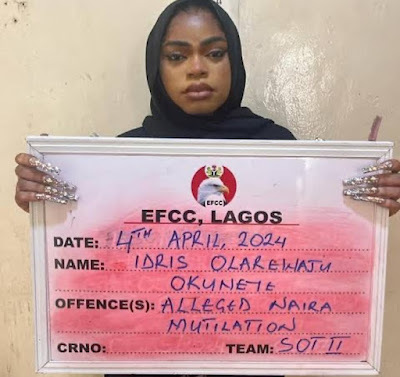 |
| Bobrisky’s N200M Lawsuit: Justice Delivered in Court |
The latest drama that unfolded in the courtroom with Bobrisky has received different responses from the public. It as felt if this was another whole chapter situation; it wasn’t the already headline-grabbing riddled life with controversy, Bobrisky. However, when against Justice, the EFCC Alexander Bobrisky Owoeye had expected his ruling all; the case was 28th dismissed due to November, insufficient evidence, and the not court’s inability to outcome prove Bobrisky’s allegations.
Let’s unpack what happened, shall we?
The Claims and the Drama
The popular social media personality, , whose real name is Okuneye Idris Olanrewaju, had gone to the EFCC to report that his rights had been violated. He further alleged that he has been harassed, arrested, and even threatened by the Commission. To make it all official, he went to the court to seek an injunction to stop the EFCC or any person acting on behalf of the Commission from arresting, detaining, or declaring him a fugitive. He also sought compensation of two hundred million naira as the cost of the damage, according to him.
On paper, it sounds serious. But in court? Not so much. Justice Owoeye was clear: Bobrisky failed to provide any solid evidence to back up his claims. Without that, the court couldn’t grant the relief he was seeking. And just like that, his case was dismissed.
A Closer Look at the Court’s Decision
This is where the whole thing becomes more fascinating. While Bobrisky’s case was more of a he-said-she-said case regarding alleged abuse, the judge’s main concern was on one thing: the evidence. This is where Justice Owoeye is coming from; the allegations made could not be supported by concrete evidence that would stand in a court of law. Consider it like having all the materials for a house, but without a proper foundation, it is all for nothing.
In his supported ruling, by the facts, Judge You made it just clear that for any claim petition that presented your rights, the court has infringed upon them, and you have to prove it. And in Bobrisky’s case, this wasn’t done either. Consequently, not only was his case thrown out, but he also lost the opportunity to seek damages.
What This Means
This ruling might feel like a personal defeat for Bobrisky, but it also raises bigger questions about the legal system. Is the bar for proving fundamental rights violations too high? Or was this simply a matter of weak evidence? Some argue that the court’s decision sends a strong message about the importance of backing up claims with facts. Others feel it highlights the challenges individuals face when going up against powerful institutions.
For Bobrisky, it’s undoubtedly a setback. But knowing his knack for bouncing back, this probably isn’t the last we’ll hear of him in the legal world. Whether he decides to appeal or focus on other battles, only time will tell.
The Bigger Picture
Such cases are a reminder of how fragile the relationship is between liberty and the state. It also shows us that evidence plays a crucial role in legal proceedings, especially where important issues are concerned. There will be different views on this case, and while opinions will be different on this one thing is for sure: it has raised issues of justice, accountability, and the relationships of power in our society.
